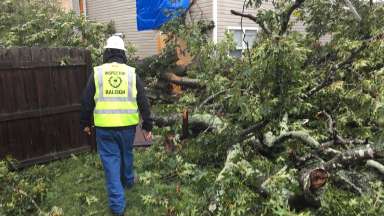Jump To:
Power loss
- If you lose power during a storm event, notify your power company as soon as possible. The company can then begin the process of restoring your power.
- Use flashlights instead of candles to reduce the risk of fire.
- If the meter box on the outside of your home is damaged, call a professional electrician to make repairs before power can be restored.
All repairs must be permitted and inspected by the City of Raleigh to ensure that all code requirements are met. Your power will be reinstated once all repairs are made and City inspectors sign off on all work.
Using a generator
DO NOT use a generator indoors. That includes the garage, carport, basement, crawlspace and other partially-enclosed area, even with ventilation. Opening doors and windows or using fans will not prevent a buildup of carbon monoxide in the home, which can’t be seen or smelled and can be deadly.
Assessing damage to your property
Use extreme caution when assessing damage to your home and property. It may be difficult to see downed power lines or sharp objects, such as glass and exposed nails. It is also possible that a dangerous structural, electrical or gas-leak hazard exists. To prevent injuries resulting from such hazards, turn off the power at the breaker box and contact your gas company to shut off the gas to the building. Then contact a professional to determine the extent of the damage.
If there is property damage
Renters
- Notify your landlord.
- Put requests for repairs in writing.
- Take photos and document the damage.
- Notify your rental insurance company of any personal property loss.
Owners
- Contact your insurance company.
- If you do not have a homeowner’s insurance policy or don’t want to file a claim, you may choose to act as your own contractor or call a contractor* to assess the damage. (If acting as your own contractor, you may be asked by the City to complete a form).
- Your insurance agent will likely send an adjuster to the property to survey the damage. Once this is done, debris removal can begin and a plan for making repairs will be made.
How to select a reputable contractor for repairs
Be cautious when selecting a contractor to repair or rebuild your home. Unfortunately, it is not uncommon for scammers to prey on storm victims. Be sure to check references and contact the Better Business Bureau to ensure that you are hiring a reputable contractor. Get an accurate evaluation and estimate for the work to be done, as well as a cost of construction and replacement items. Shop around and get multiple quotes before making a final selection.
Carefully read contracts and documentation associated with the work to be done and only sign it if you agree. Lastly, determine who will be responsible for obtaining the required permits and requesting inspections from the City. If the contractor agrees to obtain the permits, ask for a copy of the permits for your files. The permits, also known as “yellow cards,” are required to be displayed at the job site. If the work is not permitted and therefore not inspected, there is no way to ensure that it is safe for habitation. Unpermitted work may also pose problems for anyone trying to sell their property in the future.
Resources
For residential and commercial permits:
Planning and Development
Customer Service Center
One Exchange Plaza, Suite 400, Raleigh, 27601
Need Help? Submit to Ask Raleigh.
919-996-2500
